
Israeli settlements, or Israeli colonies, are civilian communities inhabited by Israeli citizens, overwhelmingly of Jewish ethnicity, built on lands occupied by Israel in the 1967 Six-Day War. The international community considers Israeli settlements to be illegal under international law, though Israel disputes this.
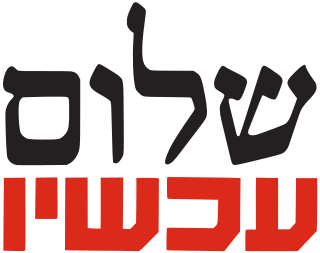
Peace Now is a non-governmental organization, liberal advocacy and activist group in Israel with the aim of promoting a two-state solution to the Israeli-Palestinian conflict.

The Israeli–Palestinian conflict is one of the world's most enduring conflicts, beginning in the mid-20th century. Various attempts have been made to resolve the conflict as part of the Israeli–Palestinian peace process, alongside other efforts to resolve the broader Arab–Israeli conflict. Public declarations of claims to a Jewish homeland in Palestine, including the First Zionist Congress of 1897 and the Balfour Declaration of 1917, created early tensions in the region. Following World War I, the Mandate for Palestine included a binding obligation for the "establishment in Palestine of a national home for the Jewish people". Tensions grew into open sectarian conflict between Jews and Arabs. The 1947 United Nations Partition Plan for Palestine was never implemented and provoked the 1947–1949 Palestine War. The current Israeli-Palestinian status quo began following Israeli military occupation of the Palestinian territories in the 1967 Six-Day War.
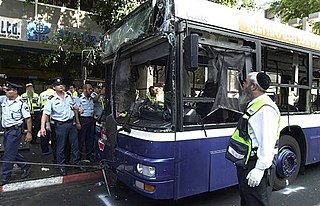
The Second Intifada, also known as the Al-Aqsa Intifada, was a major Palestinian uprising against Israel. The general triggers for the unrest are speculated to have been centred around the failure of the 2000 Camp David Summit, which was expected to reach a final agreement on the Israeli–Palestinian peace process in July 2000. Outbreaks of violence began in September 2000, after Ariel Sharon, then the Israeli opposition leader, made a provocative visit to the Temple Mount in Jerusalem; the visit itself was peaceful, but, as anticipated, sparked protests and riots that were put down by Israeli police with rubber bullets and tear gas.

The Geneva Initiative, also known as the Geneva Accord, is a draft Permanent Status Agreement to end the Israeli–Palestinian conflict, based on previous official negotiations, international resolutions, the Quartet Roadmap, the Clinton Parameters, and the Arab Peace Initiative. The document was finished on 12 October 2003. On 25 January 2022, the Swiss Federal Department of Foreign Affairs (FDFA) announced it would gradually withdraw its financial support for the Geneva Initiative, effectively ending it by 2023.

The one-state solution, sometimes also called a bi-national state, is a proposed approach to resolving the Israeli–Palestinian conflict, according to which one state must be established between the River Jordan and the Mediterranean. Proponents of this solution advocate a single state in Israel, the West Bank and the Gaza Strip. The term one-state reality describes the belief that the current situation in Israel/Palestine is de facto one-state.
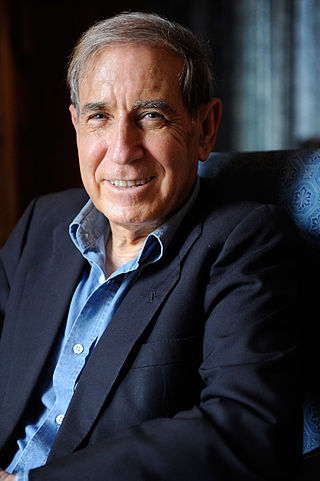
Shlomo Ben-Ami is a former Israeli diplomat, politician, and historian.

Dore Gold is an American-Israeli political scientist and diplomat who served as Permanent Representative of Israel to the United Nations from 1997 to 1999. He is currently the President of the Jerusalem Center for Public Affairs. He was also an advisor to the former Israeli Prime Minister Ariel Sharon and to Prime Minister Benjamin Netanyahu during his first term in office. In May 2015, Netanyahu named him Director-General of the Israeli Ministry of Foreign Affairs. From June 2015 until October 2016 he served as Director-General of the Israel Ministry of Foreign Affairs.

The Israeli–Palestinian peace process refers to the intermittent discussions held by various parties and proposals put forward in an attempt to resolve the ongoing Israeli–Palestinian conflict. Since the 1970s, there has been a parallel effort made to find terms upon which peace can be agreed to in both the Arab–Israeli conflict and in the Palestinian–Israeli conflict. Some countries have signed peace treaties, such as the Egypt–Israel (1979) and Jordan–Israel (1994) treaties, whereas some have not yet found a mutual basis to do so.

The status of Jerusalem is disputed in both international law and diplomatic practice, with both the Israelis and Palestinians claiming Jerusalem as their capital city. The dispute has been described as "one of the most intractable issues in the Israeli–Palestinian conflict", with conflicting claims to sovereignty over the city or parts of it, and access to its holy sites. The main dispute revolves around the legal status of East Jerusalem and especially the Old City of Jerusalem, while broader agreement exists regarding future Israeli presence in West Jerusalem in accordance with Israel's internationally recognised borders.

The Arab Peace Initiative, also known as the Saudi Initiative, is a 10 sentence proposal for an end to the Arab–Israeli conflict that was endorsed by the Arab League in 2002 at the Beirut Summit and re-endorsed at the 2007 and at the 2017 Arab League summits. The initiative offers normalisation of relations by the Arab world with Israel, in return for a full withdrawal by Israel from the occupied territories, a "just settlement" of the Palestinian refugee problem based on UN Resolution 194, and the establishment of a Palestinian state with East Jerusalem as its capital. The Initiative was initially overshadowed by the Passover massacre, a major Palestinian attack that took place on 27 March 2002, the day before the Initiative was published.

The OneVoice Movement, founded in 2002, is a global initiative that supports grassroots activists in Israel, Palestine, and internationally who are working to build the human infrastructure needed to create the necessary conditions for a just and negotiated resolution to the Israeli–Palestinian conflict.

Ruchama Marton is a psychotherapist, psychiatrist, and feminist, and the founder of Physicians for Human Rights-Israel.

Tamara Cofman Wittes is an American writer and public figure. She is a senior fellow in the Center for Middle East Policy at the Brookings Institution. She directed the Center from March 2012 through March 2017. From November 2009 through January 2012, she was a Deputy Assistant Secretary for Near Eastern Affairs at the United States Department of State. Wittes has written about U.S. foreign policy, democratic change in the Arab world and about the Arab–Israeli conflict.
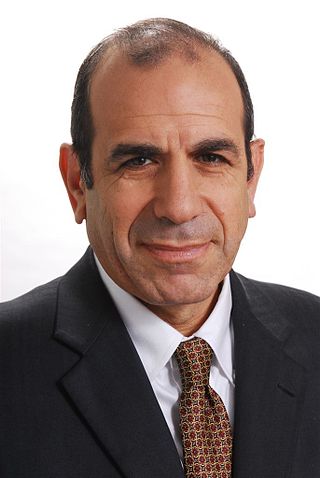
Gilead Sher is an Israeli attorney who served as Chief of Staff and Policy Coordinator to Israel's former Prime Minister and Minister of Defense, Ehud Barak. In that capacity he acted as one of Israel's senior peace negotiator in 1999–2001, at the Camp David summit in 2000 and the Taba talks in 2001, as well as in extensive rounds of covert negotiations with the Palestinians.

Israel–Saudi Arabia relations refer to the bilateral ties between the State of Israel and the Kingdom of Saudi Arabia. The two countries have never established diplomatic relations; in 1947, Saudi Arabia voted against the United Nations Partition Plan for Palestine, which aimed to split the territory of British Palestine into an Arab state and a Jewish state. As part of the Arab–Israeli conflict, Saudi Arabia has not recognized Israel since the latter's independence in 1948. Traditionally, the official Saudi policy towards the Israeli–Palestinian conflict has been supportive of the Palestinian Arabs and against Israel. However, reports have surfaced in recent years indicating extensive behind-the-scenes cooperation in the areas of diplomacy, intelligence, and security. Warming relations between the two sides are a direct result of the Arab–Israeli alliance, which came to fruition in light of the Iran–Israel proxy conflict and the Iran–Saudi Arabia proxy conflict, though it remains unofficial in nature. At the same time, the Saudi relationship with the Palestinian National Authority has been deteriorating.
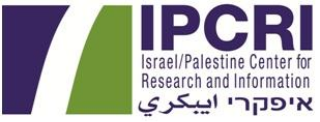
IPCRI - Israel/Palestine Center for Research and Information is a joint Israeli/Palestinian NGO and public policy think tank based in Jerusalem working towards building partnerships in Israel/Palestine. Under shared Israeli-Palestinian leadership, IPCRI carries out research and projects in various fields from economic development to environmental sustainability. IPCRI also facilitates public outreach and track two negotiations between Israelis and Palestinians.

Omar Barghouti is a founding committee member of the Palestinian Campaign for the Academic and Cultural Boycott of Israel (PACBI) and a co-founder of the Boycott, Divestment and Sanctions (BDS) movement. He received the Gandhi Peace Award in 2017.

The two-state solution to the Israeli–Palestinian conflict envisions an independent State of Palestine alongside the State of Israel, west of the Jordan River. The boundary between the two states is still subject to dispute and negotiation, with Palestinian and Arab leadership insisting on the "1967 borders", which is not accepted by Israel. The territory of the former Mandate Palestine which did not form part of the Palestinian State would continue to be part of Israel.
Tamar Hermann is an Israeli professor of political science at the Open University and a Senior Fellow at the Israel Democracy Institute (IDI).
















